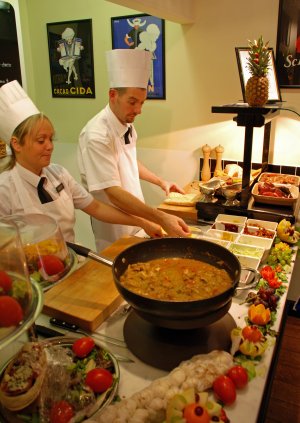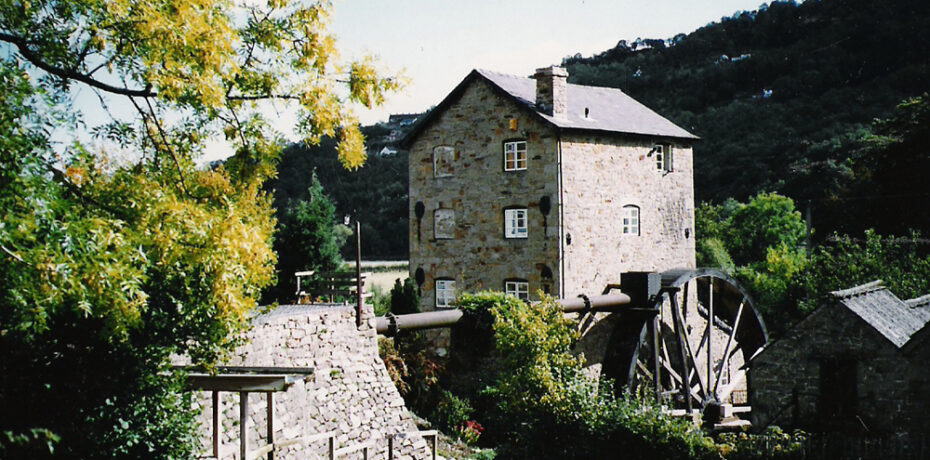A man for all seasonings
If Phil Brown hadn't launched Philpotts, the multi-award winning chain of premium sandwich shops, he might have been a cab-driver. Or a journalist. Or a tool salesman. Or a builder. Or – and these are two of the few jobs he doesn't seem to have done – an evangelising vicar in a Victorian costume drama, or perhaps an explorer.
Although he brought the modern sandwich to the North West, there is something resolutely old-fashioned about this spry man of 58, with his sharp features and beige cotton shirt, which he buys in bulk from Hong Kong.
In his book-strewn study at his converted mill on the banks of the River Dee in North Wales, an atlas lies open on the desk; "Ah, the 'stans!" he exclaims, and goes into a learned exposition on the bloody history of Afghanistan and its near neighbours. He would like to take a trip there.
His home, which he bought in 1981 for £39,000, and now shares with his wife Ingrid, son James, 15, and daughter, Rose, 12, is packed with eclectic stuff from far and near; a sago-stirring stick from Papua New Guinea, a painting of a chapel matron from a Welsh junk shop, a tortuous-looking "criminal apprehender" device invented by his father.
 Although his life experience is unusual – "I should have been a hippy but I didn't have the hair" – Gordonstoun-educated Brown's background is pure Wirral respectability. He grew up in old windmill, and recalls: "My father was a gentleman, very sage. He had a little sweetie shop, but in an earlier life he had devised the method by which puffed wheat is made and packed into Cellophane bags. He never made any money out of it. He sold it to Quaker for about £800 I think."
Although his life experience is unusual – "I should have been a hippy but I didn't have the hair" – Gordonstoun-educated Brown's background is pure Wirral respectability. He grew up in old windmill, and recalls: "My father was a gentleman, very sage. He had a little sweetie shop, but in an earlier life he had devised the method by which puffed wheat is made and packed into Cellophane bags. He never made any money out of it. He sold it to Quaker for about £800 I think."
Philpott Jnr has made considerably more, since – and this is his claim to fame – he invented the coronation chicken sandwich, and launched the Philpotts chain, starting with a 320 sq ft site in Chester in 1985.
He had tried to get the Philpotts revolution off the ground for years, but it took a trip to Australia to escape the gloom of 1970s' Britain – this is where he drove a cab – and a renewed determination to prove that sandwiches needn't be "garbage" to crystallise his ambition. His return, in 1981, was also timely. British catering was beginning its long, slow modernisation.
"I was inspired by all wonderful fresh stuff that was available in Sydney, " he says. "And the City of London was getting Birleys, Friends, and others. There was nothing like that up here, no dedicated sandwich shop at all. We were the first."
Brown wanted Philpotts to stand out. He pondered long and hard about everything, from the composition of the name to the most pleasing counter-tops ("rounded ends are friendlier," he points out). Originally, he priced Philpotts' fare higher than its competitors to help underline its "quality" appeal; he claims now that others, such as Pret a Manger, have caught up.
He reels off the list of openings: 1989, Brasenose Street in Manchester, 1990, Shrewsbury, 1992, Edgbaston and Great Charles Street, Birmingham… and then announces:
"By now I was in huge debt – I mean huge, it was something like £78,000." He says that the debt would have been paid off by 1995: "but we opened two more shops – Marsh Street, Bristol, and Mosley Street, Manchester. With successive shops ever more expensive, more elaborate and sumptuous, and with an expanding offer, we didn't really see our debts off until 2002/2003."
In 2006, the company, which by then comprised 13 outlets, had a turnover of £7m and employed at least 200 staff, was sold to Richard Tonks, the entrepreneur who founded the Savers health and beauty chain, in a deal worth £8m, funded by Lloyds TSB Corporate Markets. Not surprisingly, the new owners embarked on an aggressive roll-out and new shops are on the way in Bruntwood's City Tower and Lowry House, both in Manchester, along with more planned or Liverpool, Chester and beyond.
Tonks gained a significant and majority shareholding. Brown and existing management retained a 25% equity stake, and Brown stepped back. "It didn't need me to take it forward any more, " he says. "I had taken the business as far as my skill and energy could. It needed a different kind of person with different skills to take it forward to where it deserves to go."
He describes the day he handed over: "It was August 29, 2006. Funnily enough, I was in Cardiff to see the Rolling Stones. I got a phone call from Richard Tonks to tell me that the thing had completed. We were standing there at this reception, near the front, and I was given a play-list. The first two songs were Brown Sugar and Honky Tonk Woman. How about that?"
 "I don't have founder's disease," he insists. "I sold it to an organisation which needed them [my team]. The buyer had to be somebody who needed my team. There were organisations sniffing around who would have swept away my staff before they realised they were removing irreplaceable knowledge. If I had sold out to some huge combine they would have shut down the head office, moved it to their head office and moved everybody out." Philpotts retains its head office in Chester.
"I don't have founder's disease," he insists. "I sold it to an organisation which needed them [my team]. The buyer had to be somebody who needed my team. There were organisations sniffing around who would have swept away my staff before they realised they were removing irreplaceable knowledge. If I had sold out to some huge combine they would have shut down the head office, moved it to their head office and moved everybody out." Philpotts retains its head office in Chester.
For a rich man who doesn't need the exposure, Brown is pretty candid. Philpotts' managing director, David Mann, is rather more circumspect. "Sorry – we don't do PR. Our sandwiches speak for themselves," was the response when Place North West contacted him. It has been reported that Tonks intends to add six or seven more outlets and expand across the North and Scotland.
"Philpotts is only part of my life" says Brown, and the evidence suggests he means it. As well as extending and renovating his beloved mill, he runs the Fred Hollows Foundation (UK) (www.hollows.org.uk) which works to eradicate and prevent curable blindness in developing countries.
He also owns the Corn Mill pub/restaurant in Llangollen. This is another old mill on the River Dee, just a few miles from his home, which he "rescued" in 1995. Until last year, the Corn Mill was operated by Brunning & Price, a 14-pub strong, £17m turnover company, with outlets predominately in the North-West. In October, Brunning & Price was bought by The Restaurant Company, which owns Frankie & Benny's, Garfunkel's and Chiquito's, in a £32m deal.
If Brown has views on how this acquisition might affect what is put on the table, he is keeping quiet – for now. He is evangelical about the quality and "efficaciousness" of food, and thinks that the next big point of sandwich shop competition will be "healthy eating".
The commercial sandwich market is worth approximately £4.6bn, and 2.7bn sandwiches are purchased outside the home every year, according to the British Sandwich Association. It is a crowded and competitive market. How will it fare in 2008, as tightening economic conditions bite?
"People might not be taking a Caribbean holiday this year, but they will still want to eat a decent lunch," Brown believes. "Did you know that you will eat 11,000 working lunches in your life? Food is such a joy. Why waste even one of these occasions?"




